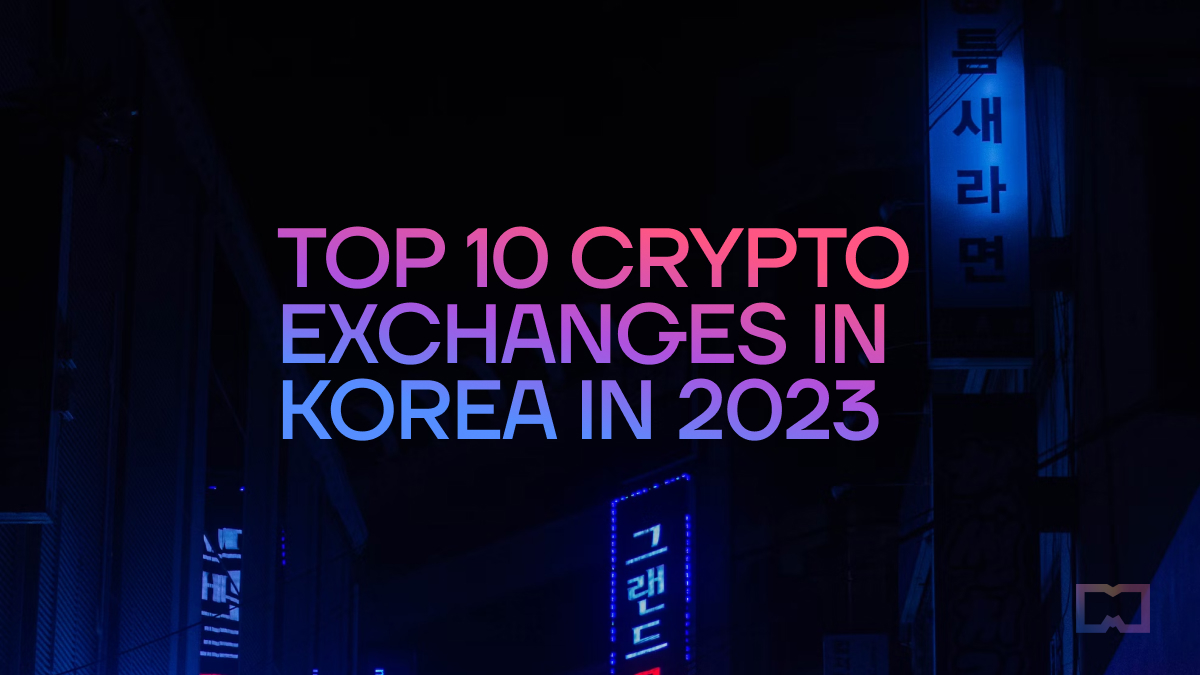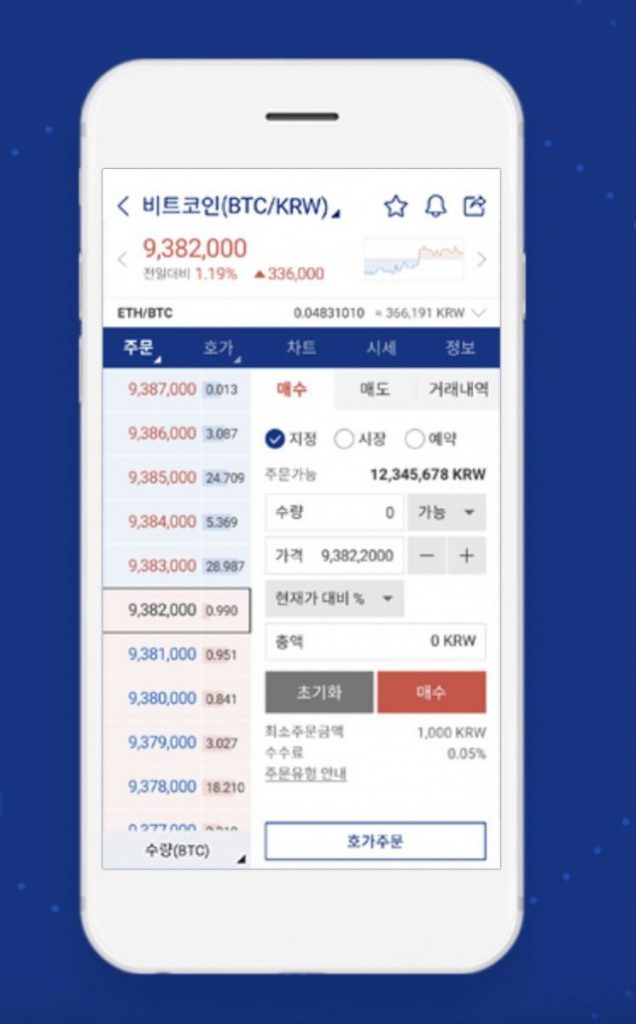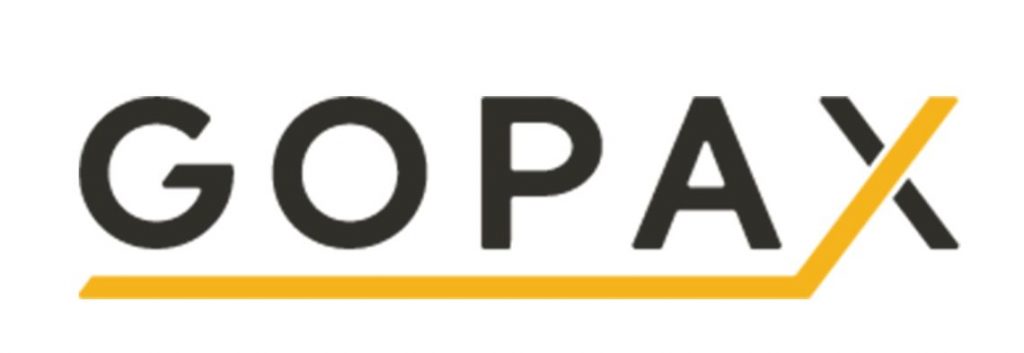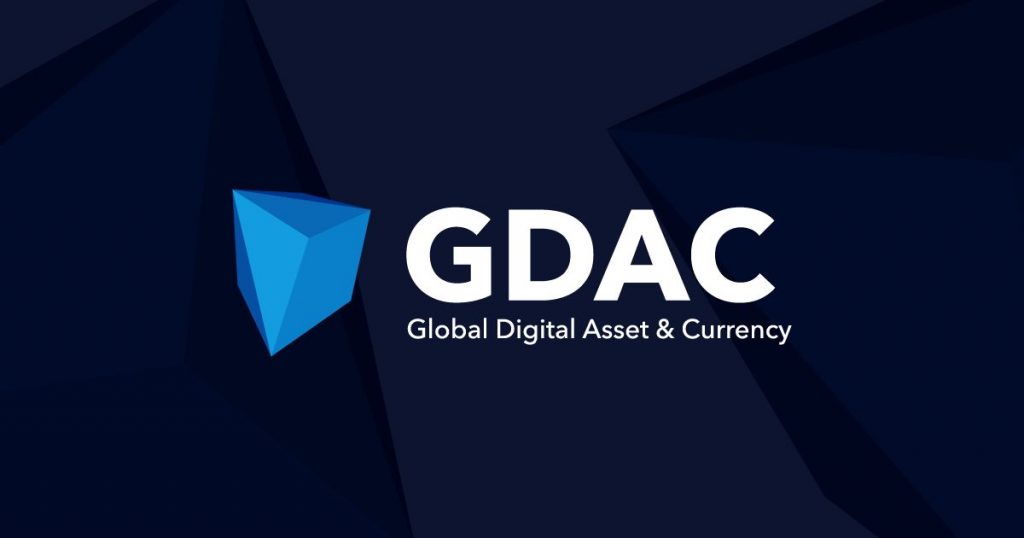Top 10 Crypto Exchanges in Korea

In Brief
The article features the top ten cryptocurrency exchanges in Korea.
The list includes Bithumb, UPbit, CoinOne, Korbit, Gopax, Huobi Korea, ProBit Korea, Hanbitco, GDAC, and Coinplug.

In 2023, approximately 2 million South Korean residents own cryptocurrencies – 3.9% of the population. The massive adoption of crypto in South Korea started in 2017, and today it is legal to buy, sell, and trade cryptocurrencies in the country. According to Triple-A, in 2021, 54% of cryptocurrency owners in South Korea were male, and 46% were female. Thirty-one percent of crypto users in the country are aged 30 to 40, 25% are aged 20 to 30, and 27% of crypto holders are over 40 years old.
Notably, Bithumb, UPbit, Coinone, and Korbit are the leading crypto exchanges, known as “The Big Four.” These platforms host 90% of all crypto assets held by South Korean residents. This listicle will explore what these and other platforms available for people in South Korea have to offer.
BitHumb

BitHumb, founded in 2014, is one of the largest cryptocurrency exchanges in South Korea, with approximately 8 million users. The platform is known for its focus on Korean won (KRW) and Bitcoin trading, making it a popular choice for users in South Korea.
The exchange offers various cryptocurrencies for trading, including Bitcoin, Ethereum, Ripple, and Litecoin. Notably, Bithumb also provides advanced trading features such as margin and futures trading. It has a user-friendly interface and a 24/7 customer support team. In addition, Bithumb provides a mobile app for iOS and Android devices. The application features real-time market data and trading charts.
Pros:
- Strong security features
- Wide selection of cryptocurrencies
- Competitive fees
- User-friendly interface
- 24/7 customer support
- Mobile app
Cons:
- Only supports South Korean Won deposits and withdrawals.
- Higher fees for non-Korean users
- Limited liquidity
- Has experienced security incidents in the past
UPbit

UPbit is a Seoul-based cryptocurrency exchange that was founded in 2017 by Dinamu Inc, a subsidiary of Kakao Corp., one of the largest tech companies in South Korea.
In December 2018, the Blockchain Transparency Institute named Upbit the third exchange in the world in terms of the trading volume. As of today, Upbit sees a trading volume of approximately two billion U.S. dollars in 24 hours, according to Statista. The exchange supports the Korean won and has one of the largest trading volumes in South Korea. It offers a wide range of trading pairs, including BTC, ETH, and USDT.
Upbit also has a mobile application for iOS and Android devices. The app allows users to trade and buy crypto on the go and provides trend analysis and market data. In addition, it enables users to check real-time prices on the lock screen and sends notifications.
On a side note, in January of this year, Upbit became the Back-of-Shirt Partner and Global Crypto-Exchange Partner of the Italian football club Napoli.
Pros:
- Large selection of cryptocurrencies
- User-friendly interface
- Strong security features
- Known as a reputable and reliable cryptocurrency exchange
- Competitive fees
Cons:
- Supports Korean won only
- Limited trading pairs
- Restricted support for non-Korean users
Korbit

Korbit is a popular cryptocurrency exchange founded in 2013 and is based in the center of Gangnam, Seoul. The platform is one of the first cryptocurrency exchanges in South Korea, with a strong reputation for security and reliability. The platform allows users to trade in Korean won and a variety of cryptocurrencies, including BTC, ETH, and XRP. The interface of the platform is friendly and easy to navigate, while Korbit’s mobile application allows users to buy and sell cryptocurrencies on the go.
On a side note, in June 2021, Korbit launched the first Korean NFT marketplace. The same year, the exchange introduced its metaverse platform, which offers users the possibility to earn points while playing.
Pros:
- Intuitive interface
- Strong security features
- Good reputation
- Wide selection of cryptocurrencies
- Quick customer support
Cons:
- Limited trading pairs
- Only supports South Korean Won deposits and withdrawals
- High fees
CoinOne

Coinone is another popular cryptocurrency exchange in South Korea. The platform provides virtual asset management and offers a variety of cryptocurrencies for trading. For instance, Coinone supports Ethereum, Ripple, Litecoin, and Bitcoin, as well as Korean won. The exchange also offers margin and futures trading. Coinone has a mobile application for easy and fast access to crypto. The app features real-time market data and trading charts.
In 2018, Coinone’s subsidiary Coinone Transfer also launched a remittance web and mobile service named “Cross.” The feature offers fast and low-cost payments in countries like the Philippines and Thailand.
Pros:
- Strong security features
- User-friendly interface
- Mobile app
- Wide selection of cryptocurrencies
- Competitive fees
Cons:
- Limited fiat options
- Limited liquidity
- Limited trading pairs
- Experienced service interruptions and downtime in the past
Gopax

Gopax is a South Korean exchange that was launched in 2018. The platform has gained popularity thanks to its user-friendly interface and fast transaction speeds. Gopax offers a variety of cryptocurrencies for trading, including BTC, ETH, and XRP. The exchange uses a multi-signature cold wallet system to store user funds, meaning users’ funds are stored offline and protected from potential hacks or security breaches.
In addition to its trading platform, Gopax offers a range of educational resources for beginners. The platform features articles, videos, and tutorials on cryptocurrency trading and blockchain technology, making it perfect for those who are just starting their cryptocurrency journey.
It’s worth noting that the world’s largest crypto exchange Binance acquired a majority stake in Gopax in February of this year.
Pros:
- Strong security features
- User-friendly interface
- Wide selection of cryptocurrencies
- Low fees
Cons:
- Only supports deposits and withdrawals in South Korean Won.
- Limited trading pairs
- Relatively basic compared to some other exchanges
Huobi Korea

Huobi Korea is a subsidiary of Huobi Global, which is headquartered in Singapore. The platform offers financial services and digital asset management. It also allows users to trade in numerous cryptocurrencies, including Bitcoin, Ethereum, and Litecoin. Huobi Korea provides a range of trading tools and features, including margin trading, futures trading, and OTC trading.
Pros:
- Wide selection of cryptocurrencies
- Strong security features
- Competitive fees
- Advanced trading features
Cons:
- Only supports Korean Won deposits and withdrawals
- Offers limited customer support
- Limited liquidity
- Limited trading pairs
ProBit Korea

While ProBit Global is headquartered in Seychelles, ProBit Korea is based in Seoul. The platform is regulated by the Korean government, which makes it trustworthy and secure. The website of the exchange has a user-friendly interface and is intuitive. The platform enables trading in both popular cryptocurrencies and less-known ones. Apart from its trading platform, ProBit Exchange Korea also offers a range of other services, including a referral program, a launchpad for new token offerings, and an over-the-counter trading desk.
Pros:
- Wide selection of cryptocurrencies
- Competitive fees
- Advanced trading features
- Strong focus on security
- Quick customer support
- Intuitive interface
Cons:
- Limited trading pairs
- Limited liquidity
- Does not have a strong reputation yet
- Only supports South Korean Won (KRW) deposits and withdrawals
Hanbitco

Hanbitco was launched in South Korea in 2017. Today, the Seoul-based exchange is popular thanks to its fast trade execution, low fees, and user-friendly interface. Hanbitco features a mobile app, a referral program, an API for developers, and an over-the-counter (OTC) trading desk. The platform also supports staking for several cryptocurrencies, which allows users to earn additional rewards for holding their coins on the exchange.
Pros:
- Referral program
- Mobile app
- OTC trading desk
- User-friendly interface
- Competitive fees
- Good customer support
Cons:
- Limited liquidity
- A small list of supported currencies
- Limited trading pairs
GDAC (Global Digital Asset Exchange)

GDAC is a Seoul-based cryptocurrency exchange known for its fast trade execution and advanced security features.
GDAC offers trading in a variety of cryptocurrencies, such as Bitcoin, Ethereum, Litecoin, and Ripple, as well as many other altcoins. The exchange also supports trading in Korean won, which makes it easier for Korean traders to buy and sell cryptocurrencies.
Pros:
- Strong security features
- Competitive fees
- User-friendly interface
Cons:
- Limited liquidity
- Limited trading pairs
- Limited advanced trading features
- Only supports South Korean Won (KRW) deposits and withdrawals
Coinplug

Coinplug is a South Korean financial company founded in 2013. It provides a Bitcoin exchange and a wallet service called “okBitcard.” In addition, Coinplug offers a two-way ATM and a payment processor for the Korean and general Asian markets.
On a side note, the company has over 300 blockchain patents in different fields.
Pros:
- User-friendly interface
- Wide selection of cryptocurrencies
- Mobile app
- Two-way ATM
- Wallet service
Cons:
- Limited fiat options
- Limited liquidity
- Limited trading pairs
- Higher fees
Frequently Asked Questions
UPbit is the leading cryptocurrency exchange in Korea. As of March 2023, the platform has reached $2,070.53 million in trading volume, according to Statista.
In 2023, 3.9% of the population of South Korea owns cryptocurrencies. The massive adoption of crypto started in 2017.
Cryptocurrencies are not legally considered money in South Korea. However, the exchanges are legal and governed by a strict regulatory framework.
The United Arab Emirates is the first country in terms of crypto adoption. 27.67% of the UAE population owns crypto.
Conclusion
Before using a crypto exchange, it is important to consider such factors as security, fees, the interface, and the availability of different cryptocurrencies.
If you live in South Korea and want to start trading cryptocurrencies, all crypto exchanges from this listicle should be a good choice. As most of these platforms only support South Korean Won (KRW) deposits and withdrawals, they are great for South Korea-based people but they might be less accessible to foreigners. You can check out one of “The Big Four” exchanges, that is, Bithumb, UPbit, CoinOne, and Korbit, or opt for one of the smaller exchanges. UPbit is the most used crypto exchange, with over $2,070.53 million of trading volume in March 2023.
Read related posts:
Disclaimer
In line with the Trust Project guidelines, please note that the information provided on this page is not intended to be and should not be interpreted as legal, tax, investment, financial, or any other form of advice. It is important to only invest what you can afford to lose and to seek independent financial advice if you have any doubts. For further information, we suggest referring to the terms and conditions as well as the help and support pages provided by the issuer or advertiser. MetaversePost is committed to accurate, unbiased reporting, but market conditions are subject to change without notice.
About The Author
Valeria is a reporter for Metaverse Post. She focuses on fundraises, AI, metaverse, digital fashion, NFTs, and everything web3-related. Valeria has a Master’s degree in Public Communications and is getting her second Major in International Business Management. She dedicates her free time to photography and fashion styling. At the age of 13, Valeria created her first fashion-focused blog, which developed her passion for journalism and style. She is based in northern Italy and often works remotely from different European cities. You can contact her at [email protected]
More articles

Valeria is a reporter for Metaverse Post. She focuses on fundraises, AI, metaverse, digital fashion, NFTs, and everything web3-related. Valeria has a Master’s degree in Public Communications and is getting her second Major in International Business Management. She dedicates her free time to photography and fashion styling. At the age of 13, Valeria created her first fashion-focused blog, which developed her passion for journalism and style. She is based in northern Italy and often works remotely from different European cities. You can contact her at [email protected]



















































